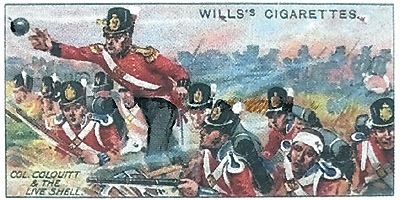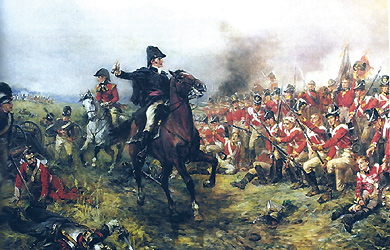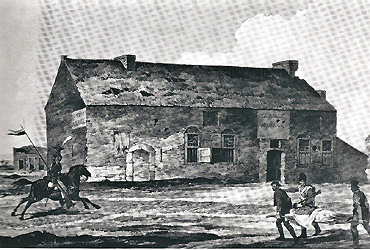|
WHAT ENSIGN WILLIAM BARTON, 1ST FOOT GUARDS,
SAW AND DID AT THE BATTLE OF WATERLOO
by Major P A J Wright OBE
formerly Grenadier Guards
|

A Wills cigarette card depicting Captain Colquitt’s
bravery at Waterloo
|
The story of Waterloo has been often told, however eye witness accounts are of particular interest. William Barton, who had carried the King’s Colour of 3rd Battalion Grenadier Guards at Quatre Bras, was well placed to describe ‘what I actually saw or did’ in the centre of a four deep square with the unfolded Colour still in his grasp when ‘this slaughtering business began’.
Prince Jerome Bonaparte, Napoleon’s brother, attacked the orchard and farm of Hougoumont with his Corps while the battery in front exchanged heavy fire with the French artillery. Behind, Barton’s square was: ‘receiving the balls and shells, twelve men at a time being wounded and two or three blown up in the air. Captain Colquitt took up one live shell and threw it out of the square’. Soon after, the great French cavalry attacks of the afternoon took place against the British squares. ‘They might just as well have charged a wall, though nothing could have been more dashing on their part, officers in front to attract our first fire. We told our men to fire low and first dismount them, then with their cuirasses and big jack boots they were sure to stick in the muddy field and be knocked over with ease, so after four desperate charges those who could disappeared and we had time to breathe’.
The orchard at Hougoumont had been lost and Lord Saltoun and the light company re-joined the battalion just before the Imperial Cavalry of France came on again. ‘I unfolded again my Colour but the Adjutant Gunthorpe called out to fold it up again. Next to me stood Pardoe, we both looking to the men’s firing and keeping well locked up, and thus we beat the cavalry again, though they brought up at the end Infantry and the balls whistled about us profusely. To my great grief one hit poor Pardoe in the forehead; he dropped on his face and spoke no more!’
After the enemy retired, Barton took Ensign Pardoe’s sash, watch and valuables and delivered them to another officer, who was a relation of his. He had enough to carry already through the wet beaten-down cornfields. Of his six colour sergeants only two were left. Pardoe’s blood-stained coat was left lying on the ground. A Sergeant recorded that a brother NCO picked up the coat and waved it, cheering on the men, saying: ‘While the officers bleed we should not reckon our lives dear’.
3rd Battalion was then moved up nearer the ridge of Hougoumont and subjected to concentrated fire from Napoleon’s artillery. ‘Then we were ordered to lie down and so fatigued were we that some of my men were snoring, fast asleep’. The French Imperial Guard had been retained fresh and in reserve all day; edged forward by Napoleon for the final blow which the elite of the Grand Army, so far uncommitted, was intended to make decisive at about seven o’clock in the evening. ‘When I was outside the wood at Hougoumont before the action began,’ said Lord Saltoun to one of Wellington’s staff, ‘I saw a column of men, as far as I can guess, about 5,000 to 6,000, go into the hollow opposite; I have kept my eye on this spot all day, and have never seen them come out yet’. And Wellington brought up his glass and called ‘By God, he is right. They are coming out now!’
‘Later up came the brave Duke calling out to us “Now Guards at them again”. And what did we behold? A large mass creeping up the incline in serried Battalions with huge fur Grenadier caps screaming out, “Vive l’Empereur en avant en avant.” We formed a line of four deep, the first rank kneeling, the second also firing, the third and the fourth loading and handing on to the front and kept up such a continued fire into mass of heaped up Grenadiers, who were also taken in flank by General Adam’s brigade and artillery, so that none ever reached the top’.
As the French Grenadiers breasted the ridge the line of Guards stood up; the accurately controlled volleys and the irresistible charge that followed ended twenty years’ of war and destroyed the Empire which Napoleon, with so much violence and suffering had achieved.
For Barton, the victory had hung on a thread and those still alive had drawn a prize in the lottery of warfare. ‘Our Cavalry was sadly cut up; we had but four hundred left of our men, lost killed and disabled, all our field officers at Quatre Bras; ... it took five days to clear away the wounded’. After a night’s sleep on the floor of the hayloft of Belle Alliance he felt fit enough to look after his men. ‘But what a sight to behold - heaps of bodies of all nations, dead and wounded - suffering! Asking for help and water lying about for miles around! This was worse than the battle itself and I was glad when the orders came to fall in and march off after the enemy. My horse had disappeared, so I had to trudge along’.
On 29th July 1815 the London Gazette announced:
‘His Royal Highness has also been pleased to approve of the First Regiment of Foot Guards being made a Regiment of Grenadiers and styled The First or Grenadier Regiment of Foot Guards in commemoration of their having defeated the Grenadiers of the French Imperial Guard upon this memorable occasion’.
Captain William Barton retired in 1833 and died on 14th May 1874 in Jersey aged 78. His account of his military career ends: ‘Those who ever take the trouble to peruse these few lines, must be indulgent, for I was never a writer or ever wished to publish; it may only interest some of my old brother officers who may have shared the perils and duties, and loves his Regiment as I did, and still do’.

Wellington and his 1st Guards
at the climax of the great victory |
 La Belle Alliance - Field of Waterloo 1815
La Belle Alliance - Field of Waterloo 1815 |
|
|



